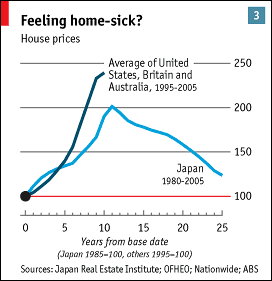Japan's big cities post first land price gain since '90/ blueprint recovery usa and the rest ?
15 jahre. das ist der zeitraum den vom peak bis überhaupt wieder ein wertzuwachs erzielt worden ist un der markt seinen boden anscheinend gefunden hat. da die bubbles gemäß der grafik vom "economist" in vielen ländern mit dem bubble in japan vergleichbar sind können sich diese länder warm anziehen. das ganze geschwafel vom soft landing sowie wie z.b. in den usa das im 2007 wieder steigende preise zu erwarten sind ist nichts anderes als wunschdenken.
wenn man jetzt nich bedenkt das dieser wertzuwachs trotz ner jahrelangen "nullzinpolitik/zero interest policy" erst nach 15 jahren erzielt worden ist macht das ganze ausmaß noch anschaulicher.
berichte aus dem rest der "welt buuble tour/ world bubble tour"
http://immobilienblasen.blogspot.com/2006/09/bubble-goes-global.html

Japan's big cities post first land price gain since '90
Real estate prices in Japan's top three cities have shrugged off a decades-long deflationary hangover to post their first year-on-year rise since 1990
In the year ending July 1, residential prices in the three main metropolitan areas of Tokyo, Osaka and Nagoya gained on average 0.4%, while commercial land prices rose 3.6%, according to a survey released Tuesday by the government's Ministry of Land, Infrastructure and Transport.
Strong demand for office space and retail space during the economic recovery underpinned the recovery in commercial prices. Improvements in employment and wages also increased home ownership.

wenn man jetzt nich bedenkt das dieser wertzuwachs trotz ner jahrelangen "nullzinpolitik/zero interest policy" erst nach 15 jahren erzielt worden ist macht das ganze ausmaß noch anschaulicher.
berichte aus dem rest der "welt buuble tour/ world bubble tour"
http://immobilienblasen.blogspot.com/2006/09/bubble-goes-global.html

Japan's big cities post first land price gain since '90
Real estate prices in Japan's top three cities have shrugged off a decades-long deflationary hangover to post their first year-on-year rise since 1990
In the year ending July 1, residential prices in the three main metropolitan areas of Tokyo, Osaka and Nagoya gained on average 0.4%, while commercial land prices rose 3.6%, according to a survey released Tuesday by the government's Ministry of Land, Infrastructure and Transport.
Strong demand for office space and retail space during the economic recovery underpinned the recovery in commercial prices. Improvements in employment and wages also increased home ownership.
The popularity of real estate investment trusts (REITs) also was supporting the rebound in urban prices. Net assets of Japanese domestic REITs amounted to 1.66 trillion yen, ($14 billion) at the end of August, compared with 563.7 billion yen a year ago, according to Lipper.
Nationwide, however, land prices continued to soften, with commercial prices falling 2.1% and residential prices down 2.3%.
The survey, which is used to calculate property taxes, is based on prefectural governments' data and uses a methodology based on an average of percentage changes in price.
Japanese economy and banking minister Kaoru Yosano said Tuesday another real estate bubble was unlikely because investors were basing their decisions on yield rather than speculating on future-price appreciation.
"The emergence of a bubble isn't possible," Dow Jones Newswires reported Yosano as saying at a press conference.
Since the Japanese property bubble peaked in 1991, prices on a nationwide level for residential land have fallen 35%, or about equivalent to the same level as 1983.

Commercial land prices have fallen 60% and are now at their lowest level since 1977, although the pace of price declines is on the wane, according to the report.
The survey found price gains were particularly strong in Tokyo's Chiyoda, Chuo and Minato wards, where residential land prices rose an average of 17.8%, while commercial prices rose 14.2%.
The report also found Tokyo land values rose sharply along the new Tsukuba Express line linking Akihabara Station with the city of Tsukuba, Ibaraki Prefecture.
A survey by the National Tax Agency last month, which uses a weighted average of land prices taken at Jan. 1, found nationwide land prices rose for the first time in 14 years.
wie man es dreht und wendet. die aufräumarbeiten werden hammerhart sein !
tough times ahead !
jan-martin
![[Most Recent Quotes from www.kitco.com]](http://www.kitconet.com/charts/metals/gold/t24_au_en_usoz_2.gif)
![[Most Recent Quotes from www.kitco.com]](http://www.kitconet.com/charts/metals/gold/t24_au_en_euoz_2.gif)

0 Comments:
Post a Comment
<< Home